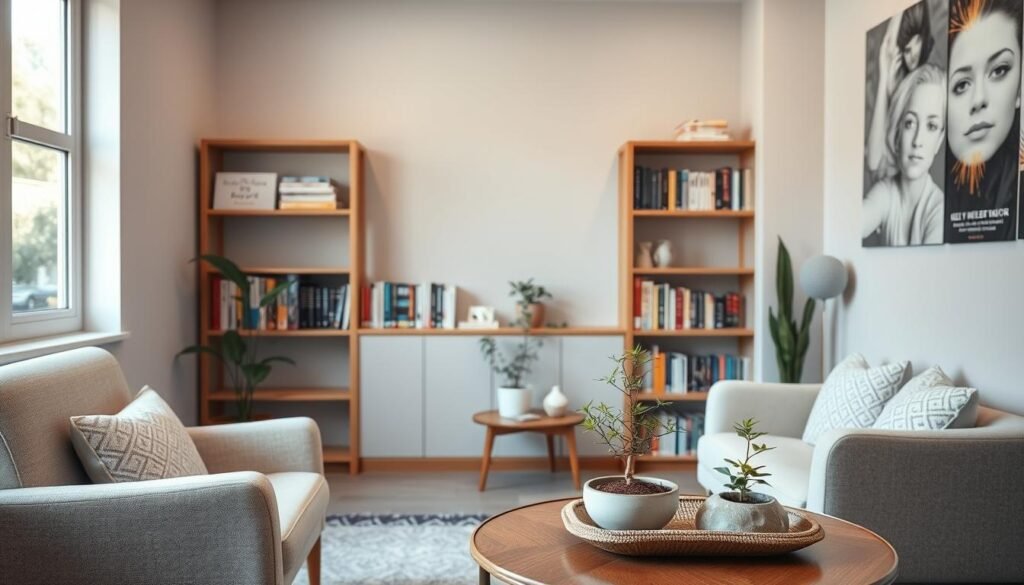About 19% of people in the U.S. deal with an anxiety disorder. Finding the right anxiety counseling is key. It helps people make big steps toward getting better.
Knowing the different treatments for anxiety is important. It could be talking to a therapist, taking medicine, or learning how to take care of yourself. Choosing the right counseling can lead to big, lasting improvements.
Key Takeaways
- Approximately 19% of Americans suffer from an anxiety disorder.
- Finding the right types of anxiety counseling is essential for recovery.
- Psychotherapy is often the first-line treatment for anxiety disorders.
- Different anxiety treatment types include therapy, medication, and self-care.
- Support groups can significantly enhance management of anxiety symptoms.
- Understanding various anxiety counseling options empowers individuals.
Understanding Anxiety Disorders
Anxiety disorders involve too much fear or worry that disrupts daily life. They show up with signs like fast heartbeats, hard time focusing, and severe worry during normal activities. Knowing about these disorders helps in finding the right types of anxiety counseling. They need special treatment methods to work well.
Common Symptoms of Anxiety
People with anxiety might face many symptoms. These can include:
- Excessive worry about different aspects of life
- Difficulty focusing or concentrating
- Physical manifestations such as rapid heart rate or sweating
- Restlessness or feeling on edge
- Sleep disturbances or fatigue
Spotting these common symptoms of anxiety is key to getting to the root of the problem.
Types of Anxiety Disorders
There are specific types of anxiety disorders. Each has its own traits:
- Generalized Anxiety Disorder (GAD): Affects nearly 7 million American adults with constant worry.
- Panic Disorder: Nearly 6 million adults suffer, often facing sudden panic that brings intense fear.
- Social Anxiety Disorder: Impacts about 15 million adults, causing big worry in social settings.
- Specific Phobias: The most known anxiety disorder, defined by extreme fear of certain things or situations.
Knowing these types of anxiety disorders helps people figure out their own issues. They can look for counseling that fits their situation.
Prevalence of Anxiety Disorders in the U.S.
A lot of Americans deal with anxiety disorders. About 1 in 5 American adults face these disorders yearly. This makes them a major mental health concern. Sadly, 30% of adults will face anxiety disorders at some time in their lives. For kids, 1 in 3 may feel anxious at some point as they grow.
By understanding and noticing these patterns, many can get the help they need. Specific types of anxiety counseling can lessen the big impact anxiety has on life.
Signs You Need Anxiety Counseling
Knowing when to get help for anxiety is key to feeling better. Signs such as constant worry, restlessness, and headaches can tell you it’s time. By recognizing these signs, you can get the help you need faster.
Identifying Excessive Anxiety
It’s easy to mistake high anxiety for normal stress. Yet, certain signs should not be ignored. These include:
- Insomnia or sleeping problems
- Feeling tired all the time
- Being easily annoyed or nervous
- Having a hard time focusing
- Experiencing stomach issues or unexplained aches
These issues can mess up both your work and personal life. Anxiety might ruin your performance at work, your relationships, and how you enjoy life.
When to Seek Professional Help
Professional help is critical when anxiety stops you from living normally. Waiting too long might lead to depression or loneliness. It’s time for counseling if:
- You feel completely overwhelmed
- Everyday tasks seem too hard
- You suffer from bad headaches or stomachaches
- You start coping in harmful ways, like too much drinking
Getting help early can lead to a better recovery. This way, you can look at life more positively.

Types of Anxiety Counseling
Anxiety counseling includes many therapies to help with different anxiety disorders. Knowing these methods lets people choose the right therapy for them. This part talks about the main kinds of anxiety counseling, with a focus on psychotherapy.
Psychotherapy Overview
Psychotherapy is key in anxiety counseling. It’s about talking with a therapist to understand and deal with feelings. Many types of therapy are proven to work well for anxiety. They range from cognitive-behavioral therapy to more specific techniques, each offering unique benefits.
Cognitive Behavioral Therapy (CBT)
CBT is a top choice for treating many anxiety disorders. It often starts to help after 12 to 16 weeks. CBT works by changing negative thought patterns and actions. It helps people see how thoughts, feelings, and behaviors are connected, leading to better coping skills.
Exposure Therapy
Exposure therapy is a part of CBT that deals with fears and phobias by slowly facing what scares someone. This approach is effective for various disorders, including social anxiety and PTSD. Using Virtual Reality Exposure Therapy (VRE) has helped, especially when real-life exposure is tough.
| Type of Therapy | Target Disorders | Key Features |
|---|---|---|
| Cognitive Behavioral Therapy (CBT) | Generalized Anxiety Disorder, Social Anxiety Disorder, Phobias, Panic Disorder | 12-16 weeks treatment focusing on thought and behavior changes. |
| Exposure Therapy | Phobias, PTSD, Social Anxiety Disorder | Gradual exposure to feared objects or situations. |
| Dialectical Behavior Therapy (DBT) | General Anxiety, Emotional Regulation Issues | Focuses on mindfulness, acceptance, and distress tolerance. |
| Acceptance and Commitment Therapy (ACT) | Test Anxiety, Social Anxiety | Combines acceptance principles with commitment to behavioral change. |
| Eye Movement Desensitization and Reprocessing (EMDR) | PTSD, Trauma-Induced Anxiety | Utilizes bilateral stimulation to process traumatic memories. |
These methods of anxiety counseling work well. They help people handle their feelings and find coping strategies that suit them. With the right method, people can feel better and improve their emotional health.
Choosing the Right Mental Health Professional
Finding the right mental health expert is crucial for effective anxiety treatment. It’s vital to know the qualifications of those you may work with. This ranges from licensed to non-licensed professionals. By understanding the differences, you can make smarter choices.
Licensed vs. Non-Licensed Professionals
Licensed professionals like psychiatrists, psychologists, and counselors have specific education and training. Psychiatrists can give meds and therapy. Psychologists offer counseling but can’t prescribe drugs. Social workers and family therapists give therapy too. They may work with others to manage your care. Non-licensed professionals offer support through coaching or peer counseling without formal credentials.
What to Ask During Your Initial Consultation
Asking the right questions during your first meeting can reveal if they’re a good fit. You should ask:
- What is your experience with specific anxiety counseling options?
- What qualifications and credentials do you hold regarding my treatment type?
- How do you approach treatment for anxiety disorders?
- Can you provide references or testimonials from previous clients?
Knowing their experience and how they plan to help you is key. This understanding helps you choose a mental health professional that meets your needs.

Complementary Anxiety Counseling Options
Treating anxiety often means using more than one method. It combines therapy and medication with self-care. This all-around approach sees the value in different kinds of anxiety counseling.
Integrating Medication into Treatment
Doctors may give medicines like SSRIs and SNRIs to fight anxiety. These drugs fix chemical imbalances in the brain. This makes you feel better and helps therapy work well. Benzodiazepines are used for quick, short-term relief.
Buspirone treats ongoing anxiety. Combining drugs and therapy tackles anxiety now and helps in the long run.
Self-Care Strategies to Enhance Counseling
Adding self-care to your daily life makes anxiety counseling more effective. Good strategies include:
- Exercise releases endorphins, lowering stress and anxiety.
- Meditation and yoga bring peace and clear thinking.
- Deep breathing exercises calm you when you’re anxious.
- Biofeedback helps you understand and manage your body’s stress response.
- Having hobbies and seeing friends builds support net and positive relations.
Using these self-care methods with counseling creates a balanced way to manage anxiety. This blend supports your mental health and strengthens how you cope, improving your overall well-being.

Different Types of Anxiety Treatment
Understanding various anxiety treatment options is key. This part tells about medications for anxiety and different counseling methods. Some methods fit better depending on what a person needs.
Medications Used for Anxiety
Medication is often the first step in treating anxiety. The common ones include:
- Antidepressants: SSRIs and SNRIs are often used.
- Benzodiazepines: They offer quick relief but can be addictive.
- Beta-blockers: They help with the physical signs of anxiety.
- Anticonvulsants: Used when other medications don’t work.
- Buspirone: It’s for long-term anxiety relief without addiction.
While these medications can help, talking to a doctor about side effects is important.
Psychotherapy and Counseling Techniques
There are lots of counseling methods that help with anxiety, including:
- Cognitive Behavioral Therapy (CBT): It helps change negative thoughts.
- Dialectical Behavior Therapy (DBT): Good for those who feel emotions deeply.
- Exposure Therapy: A type of CBT that helps confront fears.
- Mindfulness-Based Therapies: These improve mental health.
- Group Therapy: It connects people with similar struggles.
Learning what triggers your anxiety with these methods can improve how you manage it. The success of each therapy varies by the person and the severity of their anxiety.
| Type of Treatment | Purpose | Examples |
|---|---|---|
| Medications | Reduce Anxiety Symptoms | Antidepressants, Benzodiazepines, Beta-blockers |
| CBT | Change Negative Thought Patterns | Cognitive Behavioral Therapy |
| DBT | Manage Intense Emotions | Dialectical Behavior Therapy |
| Exposure Therapy | Confront Fears Gradually | Prolonged Exposure Therapy for PTSD |
| Mindfulness | Improve Emotional Regulation | Meditation, Mindfulness Practices |
| Group Therapy | Provide Support and Connection | Support groups for anxiety |
Anxiety Counseling Methods
Learning about anxiety counseling methods is key to mental wellness. We’ll look at effective behavioral therapy and holistic approaches. These strategies help manage anxiety disorders.
Behavioral Therapy Techniques
Behavioral therapy changes negative thoughts and behaviors. It includes powerful techniques:
- Cognitive reframing and restructuring: These help change negative thoughts that cause anxiety.
- Exposure therapy: By facing fears gradually, this reduces fear, helping with phobias and panic disorder.
- Therapeutic journaling: Writing down feelings and triggers promotes self-reflection.
- Behavioral activation: Doing enjoyable activities leads to a happier life.
- Guided discovery: Working with a therapist uncovers beliefs leading to anxiety.
Holistic Approaches to Anxiety
Holistic methods work well with other therapies for mental health. They include:
- Mindfulness-based practices: Mindfulness and meditation help control anxiety-related thoughts.
- Nutritional support: A good diet supports mental health.
- Physical activities: Exercise, like yoga, lowers stress and boosts happiness.
Professional help is vital for tackling anxiety. Tailored counseling plans that mix these methods offer a strong way to deal with mental health issues. For deeper insights into these strategies, check out this anxiety treatment resource.
Finding Anxiety Counseling Approaches that Work for You
It’s important to know that anxiety is different for everyone. That’s why finding the right counseling is key. Personalized treatment plans are vital. They help tackle your unique needs. These plans often mix different strategies to find what’s best for you.
Personalized Treatment Plans
Unique plans are crafted for each person’s battle with anxiety. Such plans might include therapies like Cognitive Behavioral Therapy (CBT). CBT is structured, offering 12 to 16 sessions that focus on learning practical skills. Then, there’s Acceptance and Commitment Therapy (ACT). ACT helps people mindfully live according to their values, improving emotional responses.
Integrative/Eclectic Therapy is another option. It blends various methods to fit personal needs. This approach strengthens the bond between the therapist and client.
Trial and Error in Treatment
Finding what works best in anxiety treatment is a journey. It involves trying different therapies and techniques. This process requires time and patience. For some, Exposure Therapy works well. It gently introduces them to what triggers their anxiety. Others might find Dialectical Behavior Therapy (DBT) more helpful. DBT teaches how to control emotions and improve relationships.
As therapy goes on, being flexible is crucial. It helps to adjust therapy based on what works or doesn’t. This openness is essential for effective treatment.
Preparing for Your Counseling Appointment
Getting ready for your counseling session can make it much more useful. Knowing what will happen can ease your worries. It provides a friendly setting. Understanding your own situation well makes for a meaningful talk with your therapist.
What to Expect During the Assessment
The first meeting offers a friendly space for honest conversation. Therapists will ask about your mental health, medical history, and any symptoms you have. It’s important to set goals for therapy at this time. This guides the future sessions.
Creating a List of Your Symptoms
Making a list of your symptoms is a smart move. Note down how you feel, what sets off your anxiety, and when it happens. This helps you and your counselor understand what might work best for you. It tailors the counseling to your unique needs.
| Symptom | Description | Frequency |
|---|---|---|
| Excessive Worry | Constant, uncontrollable concern about various issues. | Daily |
| Panic Attacks | Sudden episodes of intense fear or discomfort. | Weekly |
| Restlessness | Feeling on edge, unable to relax. | Several times a week |
| Social Anxiety | Fear of social interactions or performance situations. | Often |
Being detailed in your preparation for counseling leads to teamwork with your therapist. This results in a treatment plan that’s just right for you. Being open and reflective ensures a secure place for your emotional journey towards healing.
Additional Resources for Anxiety Counseling
Finding the right support is crucial for managing anxiety. Many additional resources for anxiety counseling are available. They help people learn about their condition and connect with others facing similar issues.
Support Groups and Community Resources
Support groups are a key resource for those dealing with anxiety. The Anxiety and Depression Association of America (ADAA) provides spaces for people to share their stories. They also connect people with therapists experienced in treating anxiety and depression.
Local community resources also boost emotional health. These groups offer a safe space for sharing and belonging.
For instance, individuals can access ADAA’s free webinars on anxiety. These webinars are led by experts and offer a chance for personal connection.
Educational Materials for Anxiety Management
Learning about anxiety is very empowering. There are many educational materials on how to manage it. These resources offer insight into Generalized Anxiety Disorder, Panic Disorder, and Social Anxiety Disorder. They help people understand and manage their anxiety better.
There are resources available in different languages for a broad audience. A wide range of materials on stress and mental health are at this link. They support those looking to understand their mental health better.
Conclusion
About 40 million people in the U.S. have anxiety disorders. Sadly, only around 36.9% get the help they need. It’s key to know the different ways to treat anxiety. These can include talk therapy, like Cognitive Behavioral Therapy (CBT), or meds such as antidepressants.
Tackling mental health can seem tough. Yet, with the right support and options, managing anxiety is doable. People can explore different treatments. These might be therapy, natural methods, or help from the community. For those with specific fears or social anxiety, there are treatments focusing on facing these fears directly.
If anxiety affects you, it’s important to reach out for help. This could be through counseling or simple self-care practices. There are many ways to fight anxiety, giving people a chance to find their own way to feel better. Making mental health a priority is a big step. Finding the right support can truly change lives.